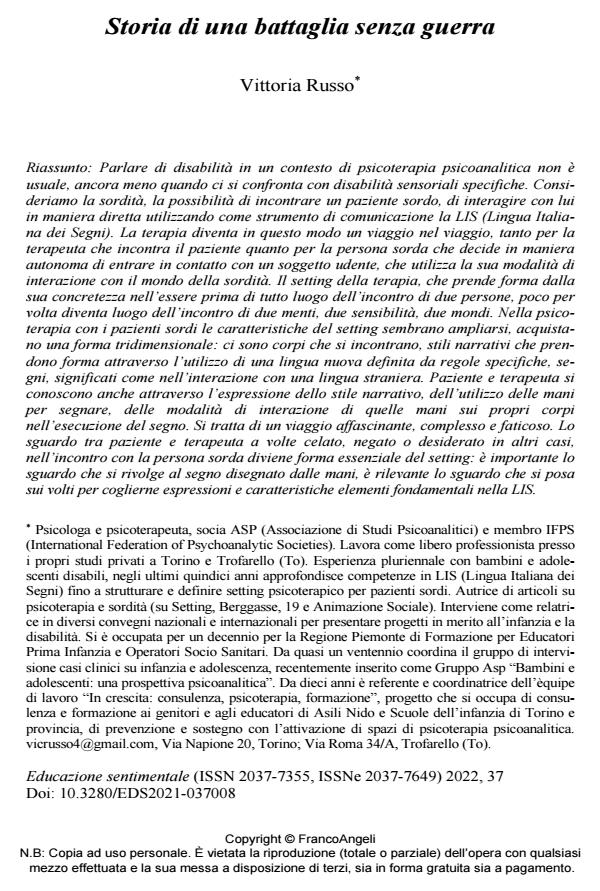Storia di una battaglia senza guerra
Journal title EDUCAZIONE SENTIMENTALE
Author/s Vittoria Russo
Publishing Year 2022 Issue 2022/37
Language Italian Pages 11 P. 92-102 File size 260 KB
DOI 10.3280/EDS2022-037008
DOI is like a bar code for intellectual property: to have more infomation
click here
Below, you can see the article first page
If you want to buy this article in PDF format, you can do it, following the instructions to buy download credits

FrancoAngeli is member of Publishers International Linking Association, Inc (PILA), a not-for-profit association which run the CrossRef service enabling links to and from online scholarly content.
History of a battle without war. Talking about disability in a context of psycho-analytic psychotherapy is not usual, even less so when dealing with specific sen-sory disabilities. We consider deafness, the possibility of meeting a deaf patient, of interacting with him in a direct way using LIS (Italian Sign Language) as a communication tool. In this way, therapy becomes a journey into the journey, both for the therapist who meets the patient and for the deaf person who decides independently to get in touch with a hearing subject, who uses his mode of inter-action with the world of deafness. The setting of therapy, which takes shape from its concreteness in being first of all the place of the meeting of two people, grad-ually becomes a place of the meeting of two minds, two sensitivities, two worlds. In psychotherapy with deaf patients the characteristics of the setting seem to ex-pand, they acquire a three-dimensional shape: there are bodies that meet, narra-tive styles that take shape through the use of a new language defined by specific rules, signs, meanings as in the interaction with a foreign language. Patient and therapist also know each other through the expression of the narrative style, the use of hands to mark, the ways of interaction of those hands on their bodies in the execution of the sign. It is a fascinating, complex and tiring journey. The gaze be-tween patient and therapist sometimes hidden, denied or desired in other cases, in the encounter with the deaf person becomes an essential form of the setting: it is important the gaze that turns to the sign drawn by the hands, it is relevant the gaze that rests on the faces to grasp expressions and characteristics fundamental elements in the LIS. The meeting with Edoardo, a young adult patient at the time of the first contact to start a therapy, presents little by little the plot of a narrative never heard but perhaps even before never narrated. In the signs that almost tim-idly allow themselves patient and therapist, the evolution of a path is grasped, which within the setting takes shape and transforms. Edoardo grows up, his ther-apist with him and the place of the sessions becomes a precious moment of emo-tional and affective sharing. Edoardo’s desire for autonomy, his projects outlined within the therapy one day unfortunately are abruptly cut, denied by a closed family environment and frightened in the face of his son’s progress. Edoardo leaves the scene, forced to leave the place of therapy becomes deaf again in front of his possibilities of growth. The setting of the therapy loses the presence of Ed-oardo, time expands and the months become years in the memory of his absence. The outbreak in everyone’s life of the pandemic upsets rhythms and customs, ther-apies seek new arrangements to define new forms of encounter and cope with the new reality. In this climate Edoardo after years decides to resume his therapy, to give new shape to the setting of his clinical work. Edoardo wants the meeting in presence, the use of masks symbolically made him feel the pain felt for the denial of communication, with emotion he finds his place with his therapist and can re-sume the plot of his narration. The work with Edoardo allows us to grasp the specificity of the setting, which has found space in the patient’s mind, keeping him company during the years of absence from the place of therapy. Edoardo has kept within himself the sense of therapeutic work, he has managed to listen to himself and recognize in the search for the lost setting the voice of that relation-ship that made him feel alive. Keywords: deafness, LIS (italian sign language), setting, relationship, listening, narration.
Keywords: sordità, LIS, setting, relazione, ascoltare, narrazione.
Vittoria Russo, Storia di una battaglia senza guerra in "EDUCAZIONE SENTIMENTALE" 37/2022, pp 92-102, DOI: 10.3280/EDS2022-037008